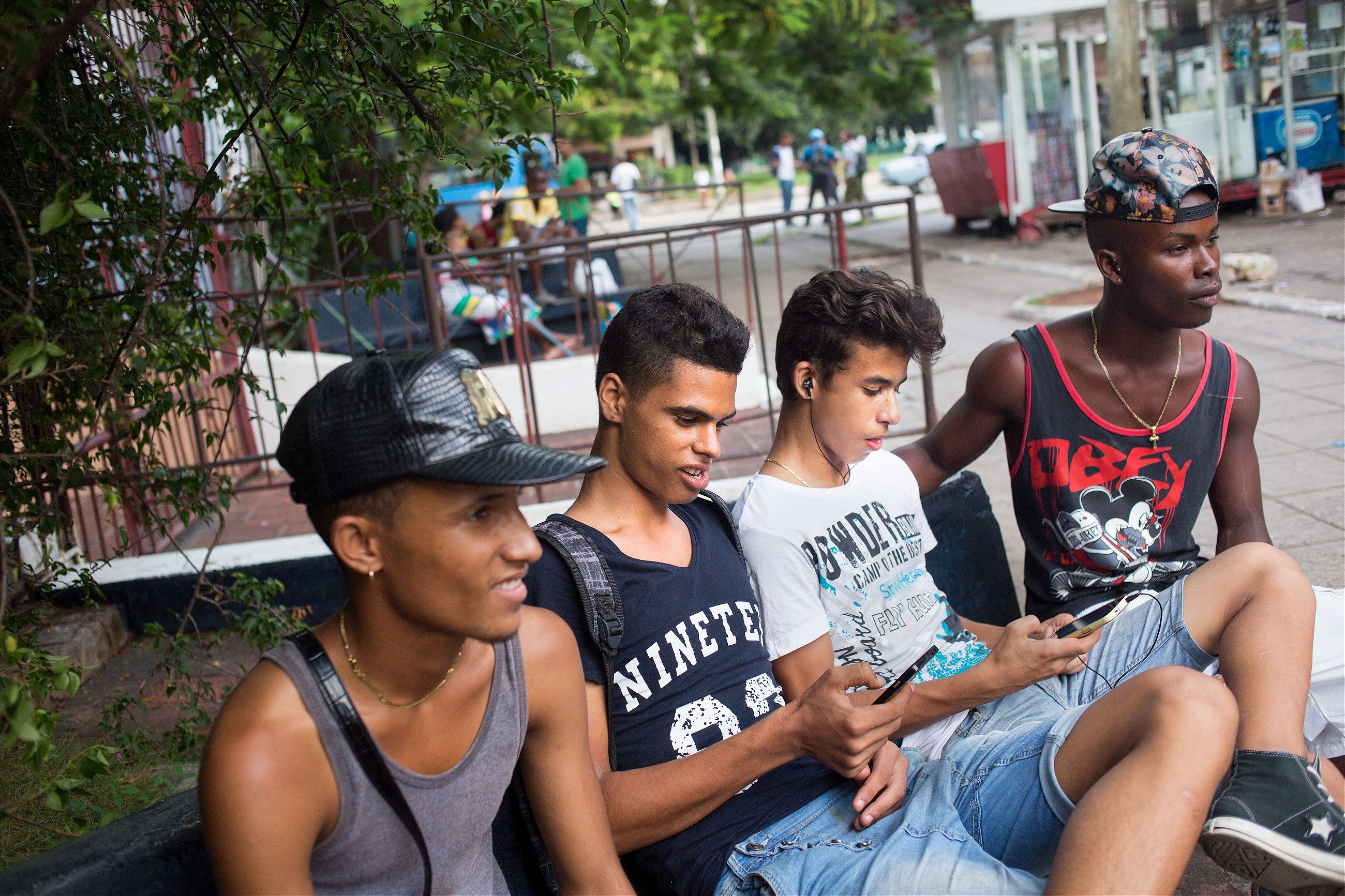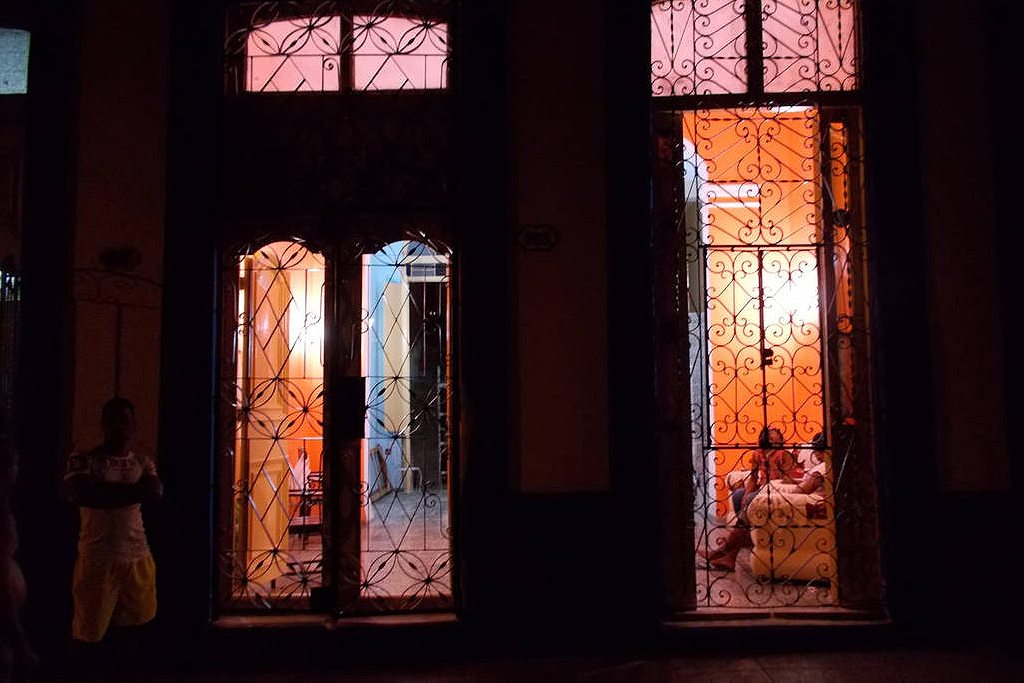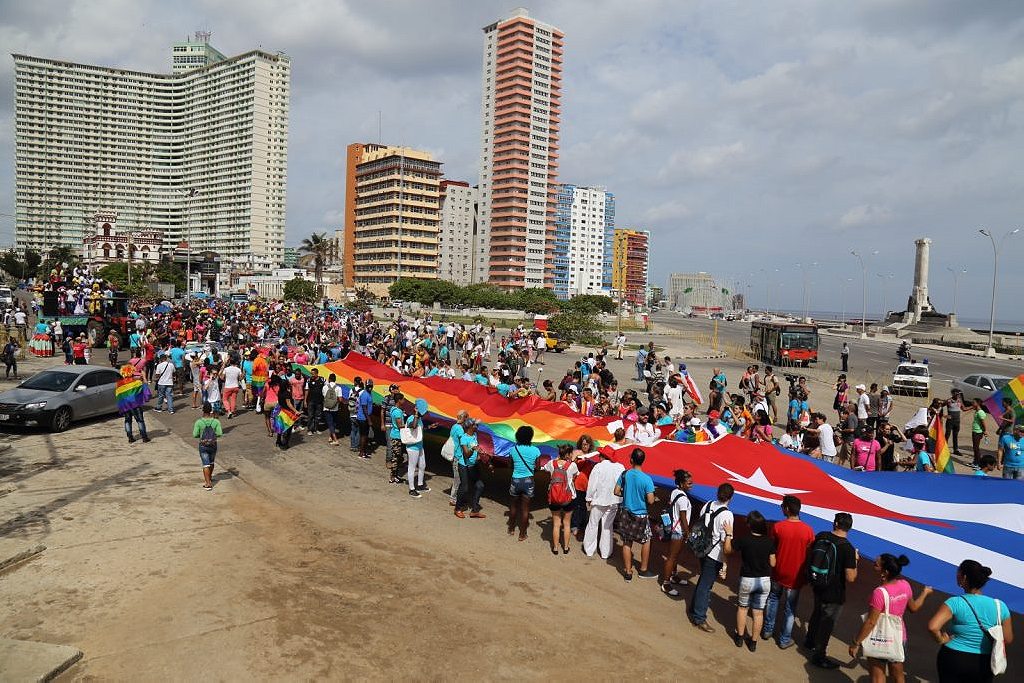As more Cubans get online, an increasing number of men use apps to meet other men.
HAVANA, Cuba—
It’s 11 p.m. on a pleasant, breezy Wednesday night in Havana as I walk into one of the city’s public parks with for-pay Wi-Fi. I’m in the Vedado district, the city’s entertainment hub, which is filled with tall modernist buildings, art deco walk-up apartments, and pre-Revolution upper-middle-class homes.
The park is bustling with people. There’s a group of teenagers gathered around a bench streaming Rihanna videos loudly on speakers, people video-chatting with what I assume are relatives scattered around the world, and folks hanging out with friends while scrolling through their social media pages on their mobile phones.
I take a seat at one of the only empty benches in the park, get online using the internet-card access code I bought earlier, which has 22 minutes of use left, and open my Grindr app.
Grindr is a ubiquitous networking application geared towards gay and bisexual men, designed to help them meet other men in their area. The app uses a mobile device’s geolocation, allowing users to locate other users who are nearby. I use it while traveling to make new friends, ask for recommendations, and meet other guys.
A few moments after I open the app, I receive a message from a 24-year-old college student who’s about a mile away. He tells me his name is Javier. He sends me a few photos, and he says he’s at a Wi-Fi park close to his dorm. He also tells me he only has two minutes left in his internet card and that I should call his cellphone to continue chatting. This is the first time while using Grindr that someone has given me his phone number after exchanging just a few messages. The limitations of internet access in Cuba seem to expedite such interactions and elevate their sense of urgency. It turns the platform more into a gay telegram system than a chatting app.

Most of the cruising in Havana still goes on at nightclubs, public parks, and the Malecón, the famous seaside strip of the Cuban capital, where it’s common to see same-sex couples holding hands and male escorts looking for clients. But as more Cubans get online, an increasing number of men use apps to meet other men.
Earlier this year, Grindr’s founder and chief executive, Joel Simkhai, visited Havana and hosted a Grindr-sponsored party at one of Havana’s gay clubs. He told Out Cuba that Cubans can benefit tremendously from the app and that he saw growing potential for his company on the island. Every time I connected to the app I would see no more that 20 people inside a five-mile radius in a city of 2 million people; this was very different from places like Bogotá, New York, and Barcelona, where many more men use the app.
Cuba remains one of the world’s least internet-connected societies, but ordinary citizens’ access to the web has skyrocketed over the last two years. Since the summer of 2015, the government opened more than 250 for-pay Wi-Fi spots in public parks across the country.
Now, for about 3 convertible Cuban pesos, or CUCs—about $3 dollars—Cubans can buy an internet card they can use intermittently for an hour. This is very expensive in a country where the average monthly salary is about $30.
The Wi-Fi park I used to get online in the week I spent in Havana always had people sitting in benches under the shade of big trees. It became more crowded in the evenings, when the pleasant breeze from the Caribbean Sea cooled off the neighborhood. Around the corner there is a gay club that has drag shows every night of the week, and it was common to see groups of gay guys sitting on benches together or same-sex couples kissing or holding hands.
I go back to my Airbnb and call Javier from the house phone. We end up talking for almost an hour as he tells me about his major in college, which is journalism, his hobbies, and his hometown. We arrange to meet at a park after he gets done with class the next day. Although I am meeting him for fun, I also tell him that I’m a journalist, and he agrees that I can interview him on the record.
Cuba’s Wi-Fi parks have turned into something like public living rooms
Once I meet up with Javier, he tells me over a beer at the park how much having internet access has helped his studies and allowed him to see more of what goes on around the world. “We need to open up more in Cuba, we need knowledge to be accessible to everyone and for that to happen we need internet to be affordable,” he says.
He asks me how internet works in Bogotá and I tell him that I pay about $20 for a monthly data plan and that I can access my apps 24/7. I also tell him you can connect anywhere to Wi-Fi and that I also have it at home. He looks at me somewhat bewildered and says, “We need to bring that here.” Cuba’s Wi-Fi parks have turned into something more like public living rooms. It’s common to see people stick around until past 3 in the morning on any weeknight.
After we have a couple more beers we walk along the Malecón and I ask Javier if he wants to hang out at my AirBnb. Five years ago, President Raul Castro began letting Cubans buy and sell property. But it’s only in the last two years, with warmer relations between the U.S. and Cuba, that the rush on real estate has picked up. Now, with some access to the internet, Cubans can host tourists in their homes through online bookings.
My Airbnb host, Bety, lives in an apartment around the corner from the colonial house she rents out. She bought the house a year ago with the help of her sister, who lives in Australia. Bety says that business has been great. “I want to buy another house soon and rent it out,” she tells me. She rents out four rooms for about $30 a night each and charges $5 for a homemade breakfast, which means that in just one night, she earns more than four times the amount an average Cuban makes a month.
Before booking, I read in her reviews that she was very gay-friendly, allowing her guests to bring someone home. This is a stark contrast to the government-mandated policy that prohibits Cuban nationals from entering hotels, especially five-star ones, even if they are invited by the guest. This is a move to discourage prostitution and sex tourism.
But I have no issue with bringing Javier over to the colonial home. “I don’t mind people sleeping with whomever they want, as long as they are respectful,” says Bety.

I was familiar with Cuba’s repression toward gays and lesbians in the past, but I also knew that a lot of progress has been made in the past decade, so I wasn’t scared to use the app on the island. Seeing openly gay people in public gave me a sense of confidence that, at least in Havana, I wouldn’t be targeted for being gay.
And attitudes about the LGBTQ community are changing fast on the island. The weekend before I left Cuba, there was a large march celebrating the International Day Against Homophobia in Havana spearheaded by Mariela Castro, President Raúl Castro’s daughter. Since 2008, she has been an avid advocate for equality.
During the early days of the Cuban revolution, there was an aggressive persecution of gays and lesbians. Many who were suspected of being homosexuals were sent to work camps in the countryside and were banned from teaching positions because they weren’t considered good role models.
Mariela Castro has been influential in changing this bias. She also organized the first gay pride parade in 2008 and now heads Cuba’s National Center for Sexual Education. “She has changed a lot of people’s minds about gay people; we owe her a lot,” Javier tells me. “It’s easier for young people to be themselves now than before.”
LGBTQ Habaneros have carved themselves a space in the capital and have become more visible. It’s common to see guys hugging each other around the Malecón and in certain parks near La Rampa, the gay area in Vedado where new gay bars have popped up in the last few years.
“This is very new. Five or six years ago, you wouldn’t see people doing that in public or going to drag shows at gay bars,” Javier tells me.

At the March Against Homophobia in Havana, most of the people wearing rainbow colors and face paint while waving pride flags were teenagers. Young Cubans are doing something that the previous generation was afraid of because of its repercussions: being themselves.
Before I say goodbye to Javier, I give him my email address, and he tells me he will write to me. I don’t hear from him again until my last night on the island. In the message, he tells me he hadn’t received his monthly stipend from his parents on time so he couldn’t buy an internet card to communicate with me. But he wants to see me.
Javier was the only guy from Grindr that I ended up meeting in person. Although I exchanged messages with a handful of other guys, it was difficult to keep the flow of the conversation, and some vanished for days at a time.
But I don’t meet with Javier again, because I had already made plans to go out with another Cuban guy I had met at a gay-friendly beach earlier that week. The beach, called Mi Cayito, is 20 miles east of Havana and is another space where many gay Cubans and tourists can be themselves free of inhibitions.
I still hear from Javier from time to time when he drops me a few lines in my inbox. He recently told me he found a way to connect to the internet for 1 CUC, about $1, instead of 3, and that he will now be able to write me more often.
